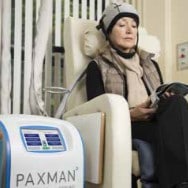Coborn Cancer Center provides comprehensive care and an extensive range of treatment options to support cancer patients and their families. We understand the importance of receiving quality cancer care and treatment close to home. We provide services in many Central Minnesota communities.
Our skilled professionals deliver outstanding clinical outcomes and a superior patient experience. This is accomplished through:
Coborn Cancer Center, a service of St. Cloud Hospital, is a regional cancer center of the highest quality. We have earned program certification of Commendation and an Outstanding Achievement Award as a Community Hospital Comprehensive Cancer Program from American College of Surgeons Commission on Cancer (CoC).
Outstanding Achievement Award

Coborn Cancer Center earned an Outstanding Achievement Award as a Community Hospital Comprehensive Cancer Program from American College of Surgeons Commission on Cancer (CoC).
Coborn Cancer Center is the only cancer program in Minnesota to achieve this designation for four consecutive surveys.
This award recognizes cancer programs that strive for excellence in demonstrating compliance with the Commission on Cancer standards and are committed to ensuring comprehensive, high-quality cancer care.
Fewer than 10% of Commission on Cancer accreditation programs receive the Outstanding Achievement Award. Approximately 15% of cancer programs in the U.S. have earned this commendation. Only 30% of all hospitals are accredited by the Commission on Cancer and 70% of cancers are treated at these hospitals.
At Coborn Cancer Center, we monitor indicators and outcomes, and compare our results to national data. Our five-year survival rates often are better than national survival rates. Multidisciplinary clinical teams are in place to select and monitor outcomes for breast, prostate, lung and head/neck cancers.
The type of cancer and stage of development will be the determining factors on which therapy treatment to use.
Chemotherapy / Immunotherapy / Biotherapy
Chemotherapy is the treatment of cancer with drugs that destroy cancer cells. These drugs are often called “anti-cancer” drugs. Immunotherapy, sometimes called biologic therapy or biotherapy, is treatment that uses your body's own immune system to help fight diseases such as cancer.
Chemotherapy/Immunotherapy:
- Is a systemic treatment (goes through your blood system and affects your entire body).
- Can be given orally, through a vein, by injection, directly at the tumor site with specialized equipment or via continuous infusion.
Depending on the type of cancer and its stage of development, chemotherapy/immunotherapy can be used to:
- Cure cancer.
- Keep the cancer from spreading.
- Slow the cancer’s growth.
- Kill cancer cells that may have spread to other parts of the body from the original tumor.
- Relieve symptoms that may be caused by the cancer.
Educational Videos:
Coborn Cancer Center chemotherapy videos
Cancer Quest: Introduction to Chemotherapy
Hematology
Hematology is the branch of medicine that focuses on the study of blood, the blood-forming organs and blood diseases. Hematology is a sub-specialty of internal medicine, separate from, but often overlapping with the sub-specialty of medical oncology.
A hematologist is a physician who specializes in the diagnosis, treatment, prevention and study of blood diseases.
Conditions commonly treated by hematologists include:
- Anemias
- Aplastic anemia, sickle cell disease, thalassemia, vitamin B12 deficiency
- Bleeding Disorders
- Hemophilia
- Blood Transfusions
- Bone Marrow Transplantation
- Infectious Diseases, Immunodeficiency Syndromes and Auto-immune Diseases
- HIV / AIDS, malaria
- Leukemia
- Neutropenia (Low White Blood Cell Count)
- Non-Hodgkin's Lymphoma
- Platelet DisordersIdiopathic Thrombocytopenia Purpura (ITP)
- Thrombosis (Blood Clotting Disorders)
Infusion Therapy
Infusion therapy involves introducing a fluid or medication into a vein to provide treatment that cannot be taken by mouth. Infusion therapy is provided to treat illness or counteract the side effects of treatment. Learn more about our Infusion Center.
Medical Oncology
Medical oncology is the specialty of internal medicine that deals with the diagnosis, management and treatment of cancer.
Medical oncologists are physicians who have specialized knowledge of all aspects of the treatment of cancer, including chemotherapy, surgery, radiation therapy and biotherapy.
Palliative Care
Palliative Care works alongside the cancer care team throughout your journey. It’s provided using a team approach with a Palliative Care physician, your Oncology Physician, advanced practice provider, RN, oncology social worker and chaplain who will help you establish and implement care plans in accordance with your values and wishes.
Planning for your future with Palliative Care
Palliative Care will spend time with you and your loved ones to help understand what the care journey might involve and provide options. Based on your wishes and values, Palliative Care can assist in choosing the smoothest, most desirable pathway for you, and help navigate any detours along the road by:
- Focusing on helping you live your highest quality of life
- Capturing your goals and wishes for your treatment
- Managing symptoms or treatment side-effects
- Providing emotional or spiritual support for you and your family
- Assisting in communicating with primary doctors and specialists
The cost of the services is covered by most health plans.
Ask your oncology provider for a referral to Palliative Care.
Radiation Oncology
Stereotactic Radiation Therapy
More Options, Shorter Treatment Times
True Beam™ system from Varian allows us to provide the patients we serve with shorter treatment times and more treatment options.
Stereotactic Radiation Therapy:
- Works best for very small tumors.
- Uses multiple narrow radiation beams.
- Targets small, well-defined areas with precision.
- Minimizes the effect on nearby organs due to extreme accuracy of treatment delivery.
- Gives high doses of radiation safely and accurately over just a few treatments (usually up to five).
Stereotactic Body Radiation Therapy (SBRT):
We now offer SBRT which is used to treat small tumors in the chest, abdomen or pelvis that cannot be removed surgically or treated with conventional radiation therapy. SBRT is delivered by a team led by a radiation oncologist.
Stereotactic Radiosurgery (SRS):
Coborn Cancer Center will soon offer SRS which is used to treat tumors of the brain or spine that cannot be removed surgically or treated with conventional radiation therapy. SRS is delivered by a team involving a radiation oncologist and a neurosurgeon. This treatment does not involve traditional surgery.
Portable Treatment for Glioblastoma
Coborn Cancer Center offers Optune®, an FDA-approved therapy for the treatment of newly diagnosed and recurrent glioblastoma (GBM). This portable and wearable device is the first FDA-approved therapy in more than a decade for newly diagnosed GBM.
Optune is approved for the treatment of adult patients (22 years of age or older) with GBM. For newly diagnosed patients, Optune is used with the chemotherapy temozolomide (TMZ) after surgery and radiation with TMZ.
For recurrent patients, it can be used alone when surgery and radiation treatment options have been exhausted. In a clinical trial, adding Optune to TMZ was proven to delay GBM tumor growth and extend survival in newly diagnosed patients compared with TMZ alone.
For more information about this device, go to Optune.com.
Coborn Cancer Center offers a new dimension of care that is designed to provide you with access to information and services that can enhance your quality of life throughout your cancer journey.
Coborn Healing Center
Healing and Hope
The new Coborn Healing Center is located next to Coborn Cancer Center. The 100% philanthropy-funded center serves as the connection place for survivorship services in an environment that empowers strength and resiliency for those living with cancer. Learn more about Coborn Healing Center
Patient Guide and Resources
Connections to Programs, Services
As you move through therapy or transition back to work and home, we will help you find the spiritual, psychological, social and physical resource connections you need. Learn more about available services
Becoming Our Patient
We want your visit to be as safe, comfortable and as pleasant as possible, View our guide for new patients for more information.
Patient Stories
The cancer journey is a different experience for each person. Each story is unique and personal. Though the journey is your own, you are not alone. May you find comfort and encouragement in these patient stories.
Resources for Cancer Patients
We provide resource information and links to high-quality cancer information sites. View resources
Ways to Stay Healthy
Visit our cancer prevention page for tips to help you stay healthy before, during and after cancer treatment along with recommended cancer screenings for most adults.
Young Adults with Cancer
Coborn Cancer Center provides comprehensive care and an extensive range of treatment options to support young adult cancer patients (18-40 years old) and their families.
Scalp Cooling
Men and women receiving chemotherapy treatment for certain cancers at Coborn Cancer Center can now keep control of their hair loss by using a ground-breaking scalp cooling treatment.
The Paxman Scalp Cooling System helps reduce hair loss throughout chemotherapy. The Food and Drug Administration (FDA) cleared the Paxman Scalp Cooling System in early 2017 for breast cancer patients; in 2018 the FDA expanded the clearance for use in all solid tumor cancer patients.

SO, WHAT IS SCALP COOLING?
Chemotherapy works by targeting all rapidly dividing cells in the body. Hair is the second fastest dividing cell, and this is the reason why many chemotherapy drugs cause alopecia. The hair follicles in the growth phase are attacked, resulting in hair loss approximately two weeks after the commencement of the chemotherapy treatment. The damage chemotherapy causes to the hair follicle can be alleviated by using the scalp cooling treatment, It works by reducing the temperature of the scalp by a few degrees immediately before, during and after the administration of chemotherapy.
THE NEXT STEPS
Patients interested in the scalp cooling system should discuss it with their cancer care provider. Your cancer care team can advise you if scalp cooling is likely to be successful with your chemotherapy treatment. For anyone who wants to go ahead with scalp cooling, www.PaxmanUSA.com features an online resource area designed to make the whole process as easy as possible.
![]() FINANCIAL SUPPORT
FINANCIAL SUPPORT
If you need help to pay for Paxman Scalp Cooling, don’t worry, as help is at hand. Scholarships for scalp cooling are available from CentraCare Health Foundation. Another option is Hair To Stay, a national non-profit subsidizing scalp cooling patients in the United States. You can apply for a subsidy to help you access Paxman scalp cooling treatment by contacting the Paxman Hub. A case manager will guide you through the eligibility process. Visit www.hairtostay.org
Find out more at www.PaxmanUSA.com